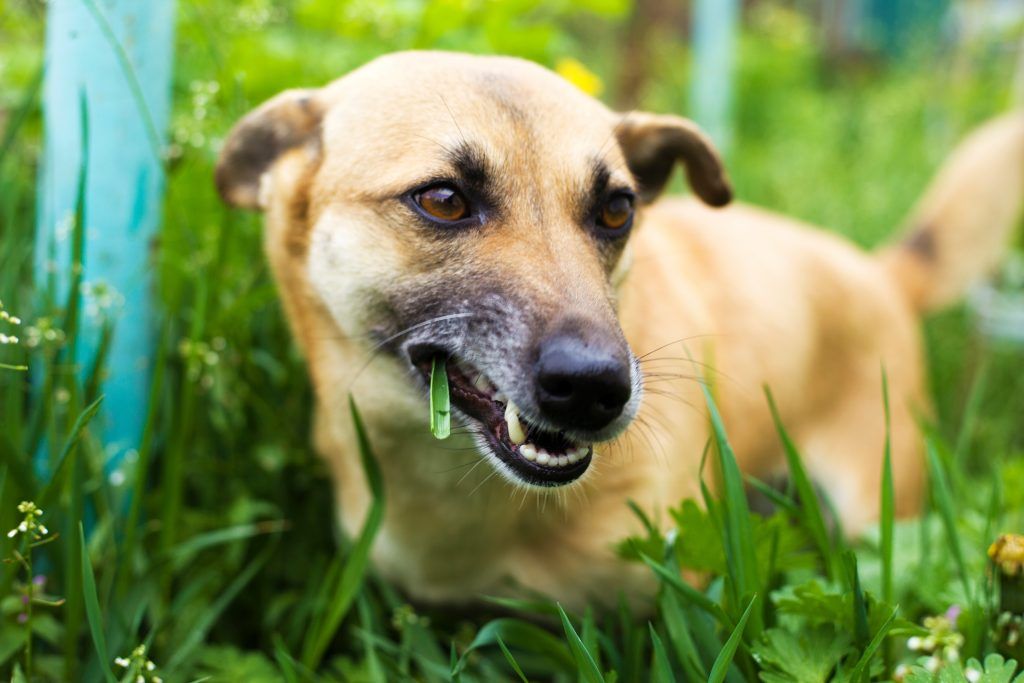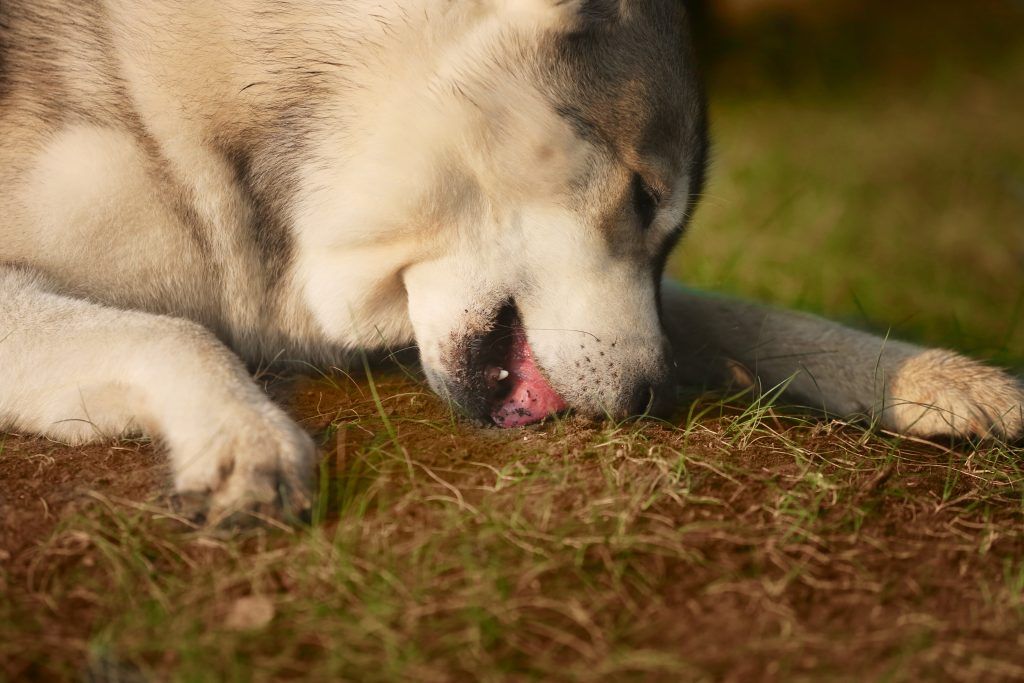There’s no limit to the odd things dogs do; some truly leave us scratching our heads. Watch your dog long enough, and you’ll see exactly what I mean. In this case, grass eating, why do dogs eat grass?
Many pup parents have seen this behavior at least once or twice. Most likely, you wondered why your dog was doing it and if it would hurt them. After all, there is nothing particularly appetizing about grass to us anyway. Fortunately, it’s not that big of a deal in most cases.
Exploring the Reasons Why Dogs May Eat Grass
Dogs eat grass for various reasons, so there is no single answer. Some of the common reasons that contribute to grass-eating behavior are:
The Instinctual Nature of Dogs
Being a descendant of ancient wolves, modern dogs share many ancestral traits. One of these is an instinct to eat grass. When wolves and dogs feel nauseous or have an upset stomach, they will eat grass in larger quantities. The physical properties of the grass irritate their stomach, causing them to vomit. This can help them expel foreign material, toxins, or rotten food they may have eaten.
Almost like a form of self-medication.
Another instinctual trait is eating grass to supplement their diet with fiber and other necessary nutrients.
Supplementing Diet
Grass contains chlorophyll, which is a natural detoxifier and anti-inflammatory agent. Grass has many antioxidants, enzymes, phytonutrients, and other components that can help a dog’s digestion, metabolism, and health.
This is more common in dogs that are fed low-quality or unbalanced foods.
Wolves commonly eat grass as a part of their diet, but they aren’t usually fed a science-backed kibble specifically made for canines.
Boredom and Attention-Seeking Behavior
One of the simpler answers, your dog is eating grass because they are bored or want attention. Dogs are highly sociable animals, so if they aren’t getting the mental and physical stimulation they need, they may eat grass to cope or express frustration.
They may also get attention when they are caught eating grass, so they repeat the behavior to get more attention, even if it’s negative.

Learned Behavior
Eating grass can also be a learned behavior. Puppies with parents that ate grass are more likely to eat grass themselves.
The Appeal of the Taste of Grass
Lastly, dogs may eat grass just because they like the taste or texture. Depending on the species of grass or season, grass can be sweet, juicy, or crunchy. Your dog might just have a curious and cultured palate.
Is Eating Grass Safe for Dogs?
Under normal circumstances, yes, eating grass is safe for dogs. If your dog is eating grass excessively or compulsively, like a dog with pica might, they should be seen by a vet.
The primary risks are if there is something on the grass that is harmful.
Pesticide Risk in Grass
One of the biggest dangers of eating grass is ingesting pesticides, herbicides, or other toxins that are often applied to yards. Many of these chemicals are harmful or even deadly to dogs, especially if they consume large amounts or frequently ingest them.
If you use any of these products to keep your yard nice, make sure you read the label. Every product I’ve ever used has directions for use around animals. On the off chance you find one that doesn’t, I suggest contacting the manufacturer.
You wouldn’t want to eat salad with an anti-freeze dressing, and your dog doesn’t either.
Fecal Material in Grass
Another thing to consider is the risk of disease or infection. Specifically from eating grass with feces on it. This could expose your dog to parasites, viruses, and nasty fungi. Giardia, salmonella, E. coli, campylobacter, and hookworms are commonly passed through fecal material.
To minimize this risk, keep your dog away from areas where other animals poop. I say minimize because you can’t always prevent it. I found deer droppings in my yard the other day; I didn’t even realize we had deer in the area.
How To Prevent Your Dog from Eating Grass
Although eating grass is not necessarily bad for your dog, some owners will want to prevent or reduce this behavior for various reasons. Here are a couple of tips to try.
Divert Your Dog’s Attention
Distraction can be a simple training method. Use toys, treats, games, or commands to get your dog’s attention away from the grass. Reward them for focusing on what you want instead, and be consistent.
If they are eating grass out of boredom, give them something safer to chew on, like a bone to keep them busy.
Changing the Environment to Limit the Habit
Another suggestion is to change their outdoor environment. Limit their time on the grass or give them other things to satisfy their curiosity. Adding plants like basil, mint, rosemary, chamomile, or thyme can capture their attention. As an added bonus, if your dog does eat these herbs, they are safe and provide a number of health benefits.
Dietary Changes
If you feel like your dog is eating grass because they are lacking certain nutrients in their diet, you can switch up what they eat. It’s best to talk to your vet about dietary changes first. They may recommend trying a different type of food or adding supplements to your dog’s diet.
When to Consult a Vet?
In some cases, a dog eating grass can indicate an underlying health problem. Some signs to look for are:
- Eating grass excessively or obsessively
- Vomiting frequently or persistently after eating grass
- Showing signs of illness such as lethargy, loss of appetite, weight loss, fever, dehydration, blood in stool, or abdominal pain
- Having difficulty passing stool or having diarrhea
- Presence of worms or parasites in their stool
- Allergies or skin problems related to grass
- Having dental problems such as broken teeth or gum disease
If you notice any of these signs in your dog, you should take them to the vet as soon as possible. Your vet can diagnose the cause of your dog’s grass-eating behavior and prescribe the appropriate treatment. Your vet can also:
- Perform blood tests, urine tests, stool tests, or other diagnostic procedures to check for any underlying health issues or nutritional deficiencies that may be causing your dog to eat grass.
- Recommend dietary changes or supplements to improve your dog’s digestion and nutrition and reduce their grass-eating habit.
- Prescribe medications or therapies that can treat any infections, parasites, allergies, or diseases that may be affecting your dog’s health or behavior.
- Refer you to a behaviorist or trainer who can help you address any psychological or behavioral problems that may be contributing to your dog’s grass-eating behavior.
Similar Behaviors – Why Do Dogs Eat Dirt
Eating grass is not the only unusual behavior that dogs may exhibit. Some dogs may also eat dirt, which is known as geophagia. This behavior can have similar causes and consequences as eating grass, but there are some differences as well.

Possible Reasons behind Eating Dirt
Some of the possible reasons why dogs may eat dirt are:
- To obtain minerals or other nutrients that they may be lacking in their diet. Dirt can contain iron, calcium, phosphorus, potassium, and other elements that are essential for dogs’ health. Some dogs may crave these substances and eat dirt to obtain them.
- To improve their digestion or treat gastrointestinal issues. Dirt can act as a natural antacid or laxative for dogs, helping them regulate their stomach acidity or bowel movements. Some dogs may eat dirt to relieve symptoms such as nausea, bloating, constipation, or diarrhea.
- To cope with stress or boredom. Eating dirt can be a form of pica, which is a disorder that causes dogs to eat non-food items. Pica can be triggered by stress, anxiety, depression, or boredom in dogs, and it can serve as a way of self-soothing or distracting themselves from their problems.
- To satisfy their curiosity or explore their environment. Eating dirt can be a natural behavior for dogs, especially puppies, who use their mouths to learn about the world around them. Dirt can have different smells, tastes, and textures that may appeal to dogs’ senses.























